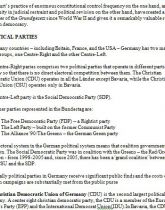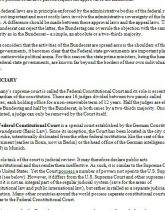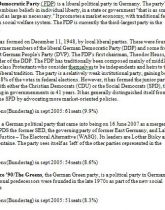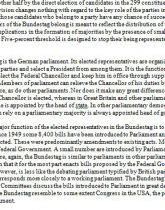Referát: Political system of Germany - referát
Skryť detaily | Obľúbený- Kvalita:65,5 %
- Typ:Referát
- Univerzita:Trenčianska univerzita Alexandra Dubčeka v Trenčíne
- Kategória:Jazyky
- Podkategória:Angličtina
- Rozsah A4:7 strán
- Zobrazené:758 x
- Stiahnuté:0 x
- Veľkosť:0,1 MB
- Formát a prípona:MS Office Word (.doc)
- Jazyk:anglický
- ID projektu:7638
- Posledna úprava:16.04.2018
The Federal President is the head of state of the Federal Republic of Germany. He represents the country in its dealings with other countries and appoints government members, judges and high-ranking civil servants. With his signature, acts become legally binding. He can dismiss the government and, in exceptional cases, dissolve parliament before its term of office is completed. The Basic Law does not accord the Federal President a right of veto such as is held by the President of the United States and other state presidents. Though the Federal President confirms parliamentary decisions and government proposals with regard to ministers, he only checks whether they have come about by the due procedure in accordance with the Basic Law.
The Federal President remains in office for a period of five years; he can be re-elected only once. He is elected by the Federal Convention, which is made up of members of the Bundestag, on the one hand, and by an equal number of members selected by parliaments of the 16 federal states, on the other. In May 2004, Horst Köhler of the CDU was elected. The reason that the President is not popularly elected is to prevent him from gaining enough popular legitimacy to circumvent the constitution, as occurred with the Weimar Republic
The head of the government is the Chancellor (equivalent to the British Prime Minister). Every four years, after national elections and the convocation of the newly elected members of the Bundestag, the chancellor is elected by a majority of the members of the Bundestag upon the proposal of the President. This vote is one of the few cases where a majority of all elected members of the Bundestag must be achieved, as opposed to a mere majority of those that are currently assembled. This is referred to as the Kanzlermehrheit (Chancellor's majority) and is designed to ensure the establishment of a stable government.The current Chancellor of Germany is Angela Merkel, who was elected in 2005. In addition to being the eighth Bundeskanzler of the Federal Republic of Germany, she is also the first Bundeskanzlerin, or female Chancellor.
The Federal President remains in office for a period of five years; he can be re-elected only once. He is elected by the Federal Convention, which is made up of members of the Bundestag, on the one hand, and by an equal number of members selected by parliaments of the 16 federal states, on the other. In May 2004, Horst Köhler of the CDU was elected. The reason that the President is not popularly elected is to prevent him from gaining enough popular legitimacy to circumvent the constitution, as occurred with the Weimar Republic
The head of the government is the Chancellor (equivalent to the British Prime Minister). Every four years, after national elections and the convocation of the newly elected members of the Bundestag, the chancellor is elected by a majority of the members of the Bundestag upon the proposal of the President. This vote is one of the few cases where a majority of all elected members of the Bundestag must be achieved, as opposed to a mere majority of those that are currently assembled. This is referred to as the Kanzlermehrheit (Chancellor's majority) and is designed to ensure the establishment of a stable government.The current Chancellor of Germany is Angela Merkel, who was elected in 2005. In addition to being the eighth Bundeskanzler of the Federal Republic of Germany, she is also the first Bundeskanzlerin, or female Chancellor.




